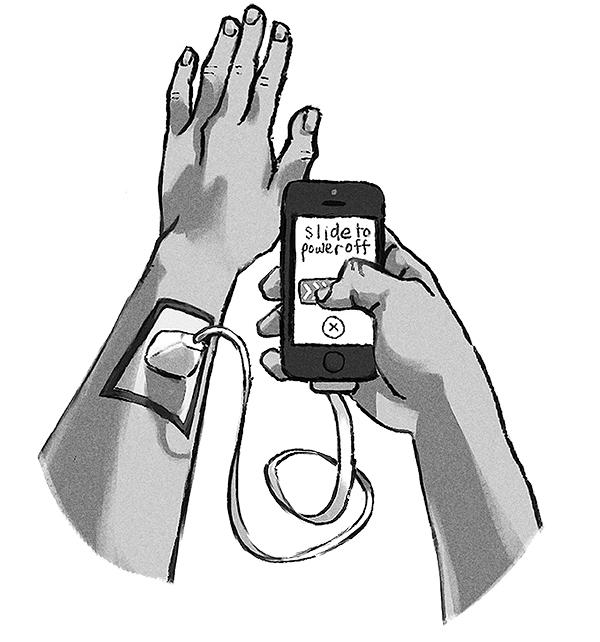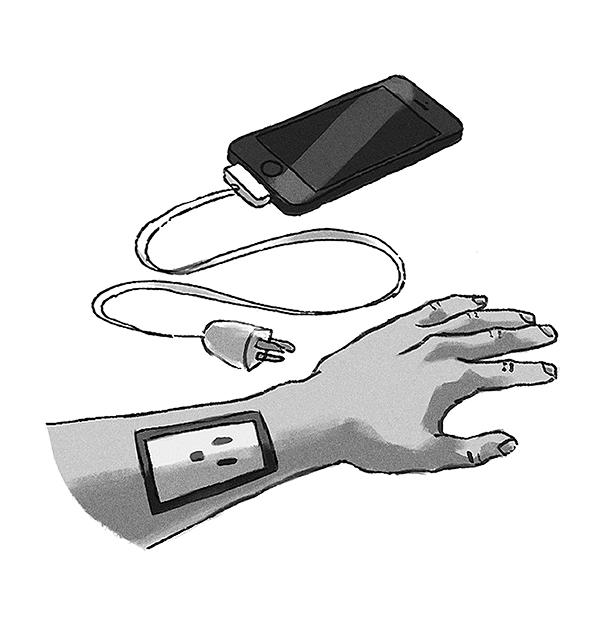Every year, my family hosts dinner on Christmas Eve, a bustling day full of activities such as cooking, cleaning the house, greeting guests, listening to relatives drone on about when I was this tall and best of all, retreating to the kitchen to stuff my face with cheese puffs and apple cider. This past Christmas Eve had all the classic aforementioned ingredients for a perfect night. That is, save for one: Me.
As the partygoers happily suffocated my brother and cousin with a wave of queries about their progress through the college application process, I found myself reticent and aloof, eyes locked on the screen of my phone. Behind the walls of my social aversion I hid, fingers scrolling out of habit through every app I could find so as to eliminate all possibility of conversation. Finally, once the last threatening guest had made their way out the door, I breathed a sigh of relief: I was once again free to do … well, what, exactly?
The more I thought about it, the more strongly I felt that this was, without a doubt, the worst Christmas Eve I had ever experienced. So busy had I been on my phone that I skirted my duties working in the kitchen, helping around the house and welcoming relatives, that I only picked at the cheese puffs, sipped the apple cider and altogether avoided the usual conversations with guests. And so, on the morning of Dec. 27, I took a leap of faith — one I had been meaning to take for a long time.
With a few presses and swipes of my thumb, I said goodbye to my 179 followers on Instagram, to smiling faces I barely knew and — when I really considered it — hardly cared about. I dismissed a growing pile of unopened Snapchats, Twitter messages and Facebook notifications. No more reshared Vines, final grade calculators, Worldstar street fights or Elite University Class of 20whatever. Goodbye to Kim Kardashian’s butt.
For two months, I went into a state of social media blackout, deleting all social media apps — Instagram, Snapchat, Facebook and Twitter — from my new iPhone 6, which had weaseled its way into my hands during every waking hour. I now use Snapchat in moderation, but have yet to re-download any other apps.
What I sought to remedy with this cleanse was the self-perpetuating nature of these apps. With each downward swipe to refresh my newsfeed, I had become increasingly worried over why I had no new notifications and so, of course, I would check again. And again. And again. And when nothing new popped up, I would skim pathetically through other apps, ones that didn’t even have notifications themselves such as the calculator or the address book.
The disease spread. Soon, like a rare-earth magnet being forcibly pried from a refrigerator, I felt troubled when not physically near my phone. I couldn’t go to bed without it. One day, I found myself, out of sheer boredom, checking what time it was in different countries across the world.
Though seemingly innocuous, social media places far too much emphasis on things we shouldn’t care about. Do we really need to know where all our friends are eating lunch on a given day? About who’s been to the City over the weekend? About everyone’s opinion on the local weather? Is it healthy to be repeatedly hit over the head with smiling, gorgeous faces — heavily edited, of course — and to see how many more favorites their posts get in comparison to mine? Should any of this even matter?
But the combination of teenage insecurities, a desire to know as much information as possible and phones that deliver information instantaneously to our fingertips creates this ridiculous freak storm, a culture where trivial and artificial material consumes a surprising amount of our thoughts.
Now, I’m not calling for any drastic measures. By no means should anyone climb a mountain and throw their smartphone to the winds, cursing the gods who brought this addictive device upon our civilization, and pledging to live the rest of their years in a forest with only a family of wolves for company. I, for one, still use my smartphone for all sorts of tasks — coordinating with friends, playing games, checking email and listening to music, to name a few — for which I find it to be an invaluable asset.
But people, especially teenagers, need to take a step back from social media. There is no value in something that amplifies our own insecurities and makes us dependent on our phones.
Life away from social media has taught me a little something about what I need to prioritize in my life. Now that I no longer sit anxiously waiting for notifications to appear on my phone, I have become noticeably happier, exercised regularly and rekindled my hobbies of reading and playing the guitar. I sleep more, am less stressed and most impressively, am often days ahead in homework despite being a second semester senior.
So if I learned anything from this venture, it’s that I prefer to live in the moment, not worrying about my post from yesterday or what my friends plan on doing tomorrow. I’m sick of being a magnet stuck on a fridge, and I honestly don’t care what time it is in Australia.
Maybe these concerns sound like a personal problem, but believe me, they apply to anyone who uses social media, which it seems, is almost everyone. And forgive me if I seem to be alienating my friends, or stubbornly sticking my head in the sand as the waves of the technological future wash over me. Yes, it will probably get a little lonely, missing out on so much information, but I see my friends enough in person as it is. Everyone deserves some alone time, and for me, that manifests itself in knocking back apple cider and cheese puffs with my family on Christmas Eve, with my phone powered off and out of sight.






